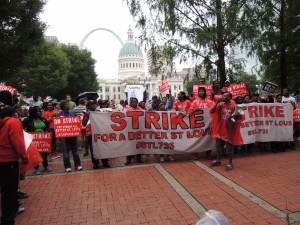
Labor Tribune photo
By TIM ROWDEN
Associate Editor
Hundreds of St. Louis area fast-food workers walked off their jobs July 29 and 30 as part of an unprecedented week of rolling strikes in seven cities across the country that has also hit New York City, Kansas City, Mo., Chicago, Detroit, Milwaukee, and Flint, Mich.
Calling for a living wage and the right to form a union, workers walked off their jobs at some of the city’s biggest national fast-food chains and rallied at different locations during the day. The rallies were held at three McDonald’s locations, Wendy’s, Hardee’s and Kiener Plaza downtown.
The St. Louis strikes started Monday at the McDonald’s on South Broadway then, spread to McDonald’s on West Florissant Road in Ferguson, where McDonald’s employee Sarita Williams, chose to join the strike line rather than report for her scheduled shift.

“I don’t get paid enough,” said Williams, 23, who supports herself and her daughter on $7.45 an hour. “Every day I go job hunting. I’m trying to find a better job.”
Low-wage jobs have accounted for the bulk of new jobs added in the recovery, and retail and fast food are among the fastest-growing sectors. Economists, elected leaders and others are citing evidence that stagnating wages and the proliferation of low-wage jobs are hampering the nation’s recovery.
STRIKES MOVE TO METRO EAST
Early July 30, about 65 fast-food workers from several metro-east restaurants gathered at the McDonald’s on 25th Street in East St. Louis. At 6:30, before daylight had settled in, they emerged from the restaurant, chanting and carrying signs, chanting, “Hey hey, ho ho, poverty wage has got to go!”
In pouring rain, they gathered at the east entrance of the restaurant, blocking the drive-through exit, until East St. Louis police ordered them to move across the parking lot to a public sidewalk area. They continued chanting and protesting for more than an hour, at one point chanting, “Come on out, we’ve got your back,” prompting one McDonald’s worker to walk off the job and join her co-workers outside their store.
STANDING IN SOLIDARITY
Fast-food workers also traveled to Creve Coeur, where they stood with coal miners fighting to save their health care and pension benefits in the bankruptcy of Patriot Coal.

“We’re trying to stand together and create something,” said Andre Houston, 24, a worker from the East St. Louis McDonald’s. “I don’t want my kids to grow up and go through the same things I am right now. We know what it’s like not to have healthcare and benefits, because in fast-food we are not guaranteed any of those things, in addition to being paid so low.”
EDUCATION
After the miner’s rally, the fast food workers moved to the Wendy’s on Manchester Road in Ballwin, where one agitated driver yelled at the strikers to “Get an education!”

One of the strikers, Joe Ryan, 22, of Belleville, a student in the paralegal studies program at Southwestern Illinois College, works at the McDonald’s in West Belleville, earning $8.25 an hour. At that wage, and with school expenses and child support payments, he can’t afford a car. Instead he rides his bicycle four miles to work each morning at 2:45 a.m. to get to the restaurant on time for his opening shift.
“Everybody says we’re lazy,” he said, referring to the driver’s caustic comment. “We bust our asses in these jobs.”
Cinnamon Tigner, 22,a young mother with a 2-year-old daughter, said she lives paycheck to paycheck on the $7.35 an hour she earns at Wendy’s

“I’m out here trying to make a difference for my daughter,” Tigner said “For my future and for her future.”
MOVEMENT GAINING SUPPORT
City, state and national elected leaders, including members of the Congressional Progressive Caucus supported the workers’ efforts, joining them on the strike lines and attending the fast food workers’ rally Tuesday afternoon in Kiener Plaza.
Congressman William Lacy Clay (D-St. Louis) and Congressman Hank Johnson (D-Ga.) joined the workers on the strike lines Monday calling for an increase in the minimum wage.

“People deserve a decent wage,” Clay said. “If they work hard and play by they rules then, they deserve to be able to support their families. It is time to raise the minimum wage.”
At the rally at Kiener Plaza, St. Louis Board of Aldermen President Lewis Reed told the workers they were at the beginning of a struggle for the rights of their families.
“You can’t have a strong family without the income that you need to put bread on the table,” Reed said. “It begins here, standing up for your families and not accepting the status quo.”
‘STL CAN’T SURVIVE ON $7.35’
The walkouts in St. Louis were coordinated by the St. Louis Organizing Committee an independent union of fast food workers formed in February. The workers’ “STL Can’t Survive on $7.35” campaign seeks a $15 an hour wage and the right to form a union without retaliation.
The strikes come on a the heels of a national wave of low-wage worker walkouts, including a strike by federally-contracted workers in Washington, DC, strikes last month by Walmart workers, walkouts earlier this year by fast-food workers in Seattle, Detroit, St. Louis and New York and combined fast-food and retail worker strikes in Chicago and Milwaukee.
Dozens of clergy, community, and labor organizations around the country are stepping up their support and resources to the workers. The campaigns are being run on the ground by local labor-community-clergy alliances, Jobs with Justice, and the Service Employees International Union (SEIU), which is providing financial and technical support to the campaigns and is lending staff to help train organizers on the ground in each of the cities.

